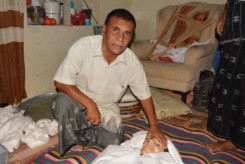
Shiher: Opposition to the deadly US drone strikes in Yemen has gained momentum after the death of a boy who was psychologically affected by a strike in 2012 in the port city of Shiher in Hadramout province.
The city has been the scene of at least two strikes that allegedly targeted Al Qaida militants.
On Thursday, hundreds of mourners attended the funeral of Hamza Hassan Bin Dahaman who suffered from serious psychological trauma after watching torn bodies of Al Qaida operatives who were killed by US drone missiles in December 2012.
The grief-stricken relatives spoke to Gulf News before his son’s funeral, saying that Hamza died on Thursday after experiencing a sharp drop of blood pressure and glucose.
“My son was haunted by the bodies of those people who were killed in Shiher’s stadium in December 2012,” the father said, as he fought back his tears.
Hassan was referring to a US drone strike that killed five Al Qaida militants inside the populated city. Al Qaida has recently issued a statement saying that a “US informant” planted tracking ships in the motorcycles of the five slain militants which guided the US drones to their locations.
The father said that a local doctor told him that his son was suffering from post-traumatic stress disorder after watching the horrible scenes of the bodies.
Memories
Omar Abdullah Al Najjar, Hamza’s close friend and one of many young people who saw the bodies, said, “We were sitting in the street when a big bang occurred. Most of my friends quickly returned home, except Hamza, my brother and I,” Al Najjar recalls.
“Out of the blue, Hamza shrieked in terror when he saw the bodies. My brother snuggled him and I recited some verses of Quran on his head and immediately sent him home. The next day, I heard that he became sick.”
Mustafa, Hamza’s elder brother, remembers that when he and his brother came back home after watching the burnt bodies, his brother began talking gibberish and kept spending long time watching himself in the mirror.
“He said to me, ‘my throat would fall into my stomach’. He used to be glued to the mirror and stay in the bathroom for hours. Sometime he fell down when he walked.”
The father, who works as a deputy director of the city’s branch of ministry of information, said that his son’s health got worse after using drugs prescribed by a local doctor.
“After weeks of sleep disorder, he began sleeping for hours and refused to leave the bed,”
The anxious father decided to try treating his son overseas. He took him first to Egypt.
“Doctors said that my son inhaled gases and the Yemeni doctor’s drugs were strong which contributed to deterioration of his health,”
Hassan said that the Egyptian doctors fed him with ten drips every day as “to clear the gases from his body”.
When the son did not make any progress in Egypt, the desperate father took Hamza to Jordan.
“Doctors repeated what the Egyptians had said before but the Jordanians notified me that my son would not live more than a couple of months since his blood circulation did not reach all organs.”
When he returned from Jordan, his son’s health got worse and began losing hearing and speech, but could eat.
Hamza’s father said that philanthropists helped him treating his son in Jordan, but he paid all expenses of his trip to Egypt.
Resentment
After burying Hamza, mourners called for a halt to the US drone strikes in their city. Local officials who attended the funeral told Gulf News that the US drones had spread panic and fear in the city.
“Drone strikes cause panic and threaten security and stability. This boy is one of many victims of the drones,” said Mohammad Bin Al Shaikh Abu Baker, the director of the city’s branch of ministry of information.
Similarly, Mohsin Yaslim Al Khashim, the former secretary general of the city’s local council, told Gulf News that following the strike that killed five people, local government officials and religious and social figures visited the governor of Hadrmaout, Khaled Al Daini, to voice their opposition to the strikes.
“We demanded him to pressure the government to stop the strikes that occur inside cities and kill innocent people.”
Al Khashim said that many students usually stay at home after each strike and some neighbours of the scene of drone strikes desert their homes for more than a month.
Hamza’ father concluded that his infirm son “smiled” at his mother before breathing his last.












